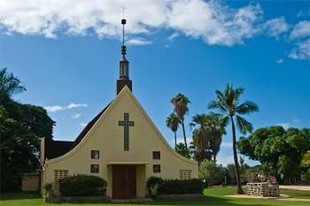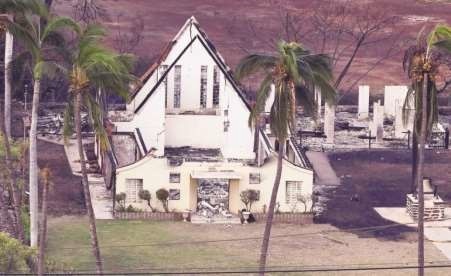Turning Points
Turning Points
“After this I will return,
and I will rebuild the dwelling of David, which has fallen;
from its ruins I will rebuild it,
and I will set it up,
so that all other peoples may seek the Lord—
even all the Gentiles over whom my name has been called.” Acts 15:16-17a
There’s no way of forgetting what happened on this day, 22 years ago. I remember I was living on Kaua‘i then, and I had the television on that morning. When I saw an airplane crashing into the side of the World Trade Center, I just kept looking at the TV, thinking it was a movie. But they didn’t show movies in the morning. And then they played that horrible film, and the others, over and over, and finally I had to accept that this was really happening.
I also remember September 11, 2002, the one-year anniversary of that great tragedy. Much of the media attention was put to remembering the attacks, but on Kaua‘i, that day marked something more relevant to them—it was the 10th anniversary of the day when Hurricane ‘Iniki hit Kaua‘i. ‘Iniki destroyed 1,400 homes and severely damaged over 5,000 homes on Kaua‘i, hitting the small island with winds of 145 mph and wind gusts of 225 mph. It caused $3.1 billion in damages, making it the most costly natural disaster in the history of Hawai‘i (though it’s likely that the recent fires on Maui will surpass that). Ten years later, the island was still only mostly recovered.
There were some stories shared of the pain suffered after ‘Iniki, mostly how institutions (including the regional ministers at the time) failed to support the rebuilding efforts. In fact, the little church I served — a native Hawaiian church in Hanapēpē, Kaua‘i—worshiped for 9 years under a used tent they were given by the US Army (Eric Shinseki’s wife was from Hanapēpē), because that’s how long it took for them to secure the funding to rebuild.
But what was most remarkable were their remembrances of community coming together. In fact, the people seemed almost wistful about those days; when I would ask how things had changed over the ten years since the hurricane, the most common response was “We aren’t community like that anymore.” This is why I was so sure that the people of Maui would care for each other after the fires. I also remember one woman who said, “We were just grateful that the hurricane hit us and not O‘ahu.” She was grateful because the population of O‘ahu is over 13 times larger than Kaua‘i, but also because all the communication and government centers for all of Hawai‘i are on O‘ahu.
What do we make of these tragedies? Almost 2,500 people die in an earthquake in Morocco. Hurricanes and wildfires occur on a more frequent basis, and in areas that had not known such disasters. And in the United States alone, 1,127,152 people died from COVID so far. And I have not even touched on deaths caused by human rage, hatred, bias, and fear.
We cannot explain why these things happen, nor can we know how an all-powerful God would allow these things to happen. But sometimes we can see shifts in the history of the world as people respond to adversity. Communities come together to recover from disaster. Former enemies reach out with compassion. Necessity, the mother of invention, causes people to try new things. We still don’t know how much church life has been changed permanently because of COVID, and some of the changes have been positive.
And sometimes people try new things because God asks them to. Today’s scripture verse comes from the Council at Jerusalem, when the Jewish leaders of Christ’s church discerned the call to allow Gentiles to come into the church without going through the Jewish tradition of circumcision. Remembering the promises of restoration that God gave to the Israelites over the centuries, the Jerusalem Council saw the new church as the restoration of Jesus’s people, a restoration that would extend even to the Gentiles—and in Romans 8, Paul suggested that even Creation would be restored as the children of God live into their calling as agents of God’s grace. And the Council came to understand that fulfilling their call would require them to do things they never could have imagined they would do—like receiving as siblings the very people they abhorred for many generations.
It is now 2023, and God is still calling us to do things we never imagined we would do. In response to inescapable signs of the danger of the climate crisis, a young seminarian works to organize the community to work in concert with, rather than against, God’s Creation. In anticipation of the post- Christendom church needing to take different approaches to connecting with the world and, frankly, creating new income streams to keep the church running, a newly-ordained pastor seeks an opportunity to practice entrepreneurship in ministry. Out of the closure of one church, another church is rising up, a church that is attracting people who had given up on church, attracting them with their radical hour of love that crosses boundaries of race, generation, and background. After years of attempts to stay alive by being their old selves, a church welcomes in a recent seminary graduate and a group of strangers larger than they are—and the groups have come together in ways that truly reflect the glory of God. And an attorney uses her training and gifts to fulfill her calling to help negotiate peace in her strife-torn home country, and helps to organize a new denomination to work towards justice and peace in El Salvador.
These are the stories that will be reflected at our Presbytery meeting on September 19th. I invite you to register today for the meeting, and the dinner before the meeting. You can register as a minister member, as a ruling elder commissioner, but also as a church member, a friend, an interested observer —and you can participate in the meeting in person at Claremont Presbyterian Church, or on Zoom. Join us, as we consider what God is calling us to do and be for this troubled world.
My favorite Hawaiian word is kuleana, which is often translated as “responsibility” but also means “right” or “privilege.” That is what we have been given as followers of Christ, the kuleana to be Christ’s good news for our world. May we encourage each other as we do so.
Relying on God’s grace,
Wendy

 Waiola celebrated its 200th anniversary this last May. The picture on the left reflected the church sanctuary on their anniversary. The larger picture shows Waiola’s church building after the fire; the fellowship hall was burned to the ground, but the cemetery, where royals like Keōpūolani were buried, is intact.
Waiola celebrated its 200th anniversary this last May. The picture on the left reflected the church sanctuary on their anniversary. The larger picture shows Waiola’s church building after the fire; the fellowship hall was burned to the ground, but the cemetery, where royals like Keōpūolani were buried, is intact. This building is the fourth over the church’s history.
This building is the fourth over the church’s history. The wedding day was unusually Presbyterian. There was a Presbytery meeting in the morning, at the home church of the groom, and the wedding followed, with all the pastors of the presbytery seated in the chancel. This church, Northminster in Macon, was in the news last year because a violent windstorm toppled the steeple from the church building. They had hoped to get the steeple back in place by the wedding, but as the groom said, they decided to embrace the fact that it didn’t happen for the PCT.
The wedding day was unusually Presbyterian. There was a Presbytery meeting in the morning, at the home church of the groom, and the wedding followed, with all the pastors of the presbytery seated in the chancel. This church, Northminster in Macon, was in the news last year because a violent windstorm toppled the steeple from the church building. They had hoped to get the steeple back in place by the wedding, but as the groom said, they decided to embrace the fact that it didn’t happen for the PCT.